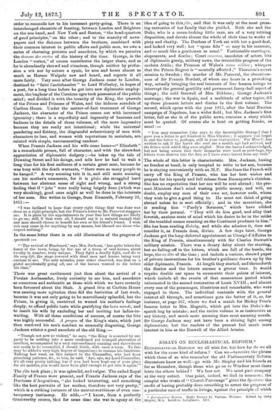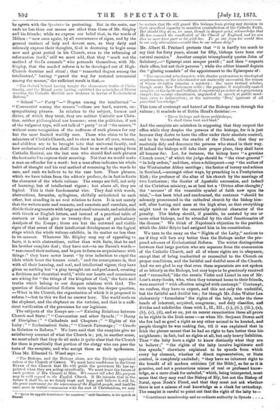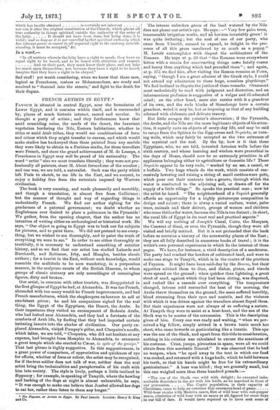ESSAYS ON ECCLESIASTICAL REFORM.*
ECCLESIASTICAL REFORM we all wish for, but how far do we all wish for the same kind of reform ? Can we—to revive the phrase which those of us who remember the old Parliamentary Reform discussions know so well—go with Mr. Shipley and his friends as far as Hounslow, though those who go on to Windsor must there leave the others behind ? We fear not. We must part company at the very outset. One point, indeed, we find in common ; the essayist who treats of "Church Patronage" gives the Sptctator the credit of having probably done something to arrest the progress of a particular case of traffic in livings, against the principle of which he agreee with the Spectator in protesting. But in the main, our ends to less than our means are other than those of Mr. Shipley and his friends; while we express our belief that, in the words of Milton: "now once again, by all concurrence of signs, and by the general instinct of holy and devout men, as they daily and solemnly express their thoughts, God is decreeing to begin some new and great period in his Church, even to the reforming of reformation itself," still we must add, that they "mark not the method of God's counsels" who persuade themselves, with Mr. Shipley, that the needed reform is to be developed out. of High- Church doctrine and ritual ; that "reasserted dogma among the intellectual," having "paved the way for restored ceremonial among the masses," the sufficient result is that,— " The Oxford School having taught the elementary truths of Chris- tianity, and the Ritual party having exhibited the principles of Divine worship, the Catholic Revival now declares in favour of Ecclesiastical Reform."
" School "—" Party "—" Dogma among the intellectual "— " Ceremonial among the masses "—these are hard, narrow, un- sympathising phrases. In relation to the subject, human and divine, of which they treat, they are neither Catholic nor Chris- tian, neither philosophical nor humane; even the politician, if not of the vulgarest type, will not talk of " party " or of "the inasses,"* without some recognition of the unfitness of such phrases for any but the most limited worldly uses. Those who claim to be the ministers of Christ's Church, and to show us how all men, women, and children are to be brought into that universal family, and how ecclesiastical reform shall thus lead to as well as spring from Catholic Revival, are the last men who should find such phrases the best suited to express their meaning. Not that we would make a man an offender for a word; but a man often indicates his whole habit of thought and his real method of reasoning by the words he uses, and such we believe to be the case here. These phrases, which we have taken from the editor's preface, do in fact indicate the character of the whole volume. The essays are full, not only of learning, but of intellectual vigour ; but above all, they are logical. This is their fundamental vice. They deal with words, abstractions, formulas, syllogisms, skilfully articulated to each other, but standing in no real relation to facts. It is not merely that the writers note and connote, and annotate and correlate, and divide their arguments with large and small numerals, and subdivide with Greek or English letters, and instead of a practical table of contents or index give us twenty-five pages of preliminary Analysis of the Essays ; those are but the outward and visible signs of that arrest of their intellectual development at the logical stage which the whole volume exhibits, in its matter no less than in its manner. Whatever Mr. Shipley may say of appealing to facts, it is with abstractions, rather than with facts, that he and his brother essayists deal ; they have not—to use Bacon's words- " renounced their notions, and begun to form an acquaintance with things :" they have never learnt " by true induction to expel the idols which beset the human mind ; " and the consequence is, that with all their learning, and zeal, and intellectual vigour, they have given us nothing but "a play brought out and performed, creating a fictitious and theatrical world," while our hearts and consciences are asking for "the things of the kingdom of God," the facts and truths which belong to our deepest relations with God. The question of Ecclesiastical Reform rests upon the deeper question, —What is the Church, the organisation of which it is proposed to reform ?—but to this we find no answer here. The world rests on the elephant, and the elephant on the tortoise, and that is a suffi- cient verification of the premisses for our logicians.
The subjects of the Essays are :—" Existing Relations between Church and State ;" "Convocation and other Synods ;" "Decay of Discipline ;" "Cathedrals and Chapters ;" "Rights of the Laity ;" " Ecclesiastical Suits ;" " Church Patronage ;" " Creeds in Relation to Reform." We have said that the essayists give no satisfactory account of what the Church is ; yet, in another sense, we must admit that they do all make it quite clear that the Church for them is practically that portion of the clergy who can pass the tests of the essayists, and who accept them as their spokesmen. Thus Mr. Edmund G. Wood says;
"The Bishops, and the Bishops alone, are the Divinely appointed rulers of the Church of CHRIST. We must have confidence in the Great RULER of the Church that He will guide the governors He has ap- pointed when they are acting synodically. We must trust the future of each portion of His Church to Him. We cannot tell what His purpose may be with regard to the English Church. If He intends that in the future it shall be, as we firmly trust and hope and believe it will be the great instrument for the conversion of the English people, and itself be once more in visible communion with the rest of Christendom, we may " Won les appelle breitalement 'les nombres,t" said Gambetta, in his speech at Nantes
be certain that He will guard" His bishops from giving any decision in their synodical capacity in manifest contradiction of the Catholic Faith. But should they do so, we must, though in deepest grief, acknowledge that He has removed the candlestick of the Church of England, and we cam then no more have part or lot with her. To go out from her would then be our only alternative—would then be our solemn duty."
Mr. Albert H. Prichard protests that "it is hardly too much to- say that for forty years, almost for fifty, bishops have been our
natural enemies." Another essayist triumphantly quotes John of Salisbury,—" Episcopi stint semper pavidi ; " and then "respects. their office, but not their persons"; while the editor himself depicts the "glaring scandals" of the appointment to the Episcopate of :
"The successful schoolmaster, with slender pretensions to theological acquirements; or the schoolmaster not eminently successful, the reason of whose elevation remains a mystery : the mere textual scholar; though acute New Testament critic ; the popular, if sceptically-mated essayist; or the facile and brilliant, if superficial preacher at a proprietary chapel ; the secular educationist, unguarded in speech at public meet- ings, even to indiscretion ; or the university Don,' ignorant of all parochial knowledge."
This tone of contempt and hatred of the Bishops runs through the. volume ; it reminds us of Robin Hood's doctrine :—
" These bishops and these archbishops, Ye shall them beat and bind."
And the essayists are mistaken in supposing that they respect the office while they despise the persons of the bishops, for it is just because they desire to have the office under their absolute control; and to be themselves the oracles of the Church, that they so. resolutely defy and denounce the persons who stand in their way.
If indeed the bishops will take their proper place, they shall have all honour due. Let, for instance, the bishop have "a genuine Church court," of which the judge should be "the vicar-general"' "in holy orders," and then, when a delinquent—say "the author of the Westminster Abbey sacrilege ; the fautor of heresy and schism in Scotland,—amongst other ways, by preaching in a Presbyteries Kirk ; the profaner of the altar of his church by the marriage of two Lutherans ; the decrier of Apostolic succession, and indeed* of the Christian ministry, as at best but a 'Divine after-thought ;". the ' accuser ' of the venerable symbol of faith now upon its- trial,"—has been tried and condemned, the sentence "should be- solemnly pronounced in the cathedral church by the bishop him- self, after having said mass at the high altar, so that everything.
might tend to show the essentially spiritual character of the penalty. The bishop should, if possible, be assisted by one or more other bishops, and be attended by the chief functionaries of the diocese." We think of Napoleon's objection to the position. which the Abbe Sieyes had assigned him in his constitution.
We turn to the essay on the "Rights of the Laity," anxious to. see if they will fare any better than the Bishops under the pro- posed schemes of Ecclesiastical Reform. The writer distinguishes- between that large portion who are separate from the communion of the Catholic Church, and all of whose rights are in abeyance,. except that of being readmitted or reconciled to the Church on
proper conditions, and the faithful and dutiful sons of the Church. And we are glad to say that even these separatists are not spokes of so bitterly as the Bishops, but may hope to be graciously received; and "reconciled," like the erratic Violet and Lionel in one of Mr.
Lear's story-books, who, when they returned home to their friends, were received "with affection mingled with contempt." Contempt,.
we confess, they have to expect, and this not only the undutiful, but the faithful and dutiful too ; for though Mr. John Walter Les elaborately "formulates" the rights of the laity, under the three heads of inherent, acquired, congruous; and duly classifies, and divides and subdivides these with I., II., III., (1), (ii.), (a); (b), (c), (d), and so on, yet on nearer examination these all prove to be rights in the Irish sense :—as when Mr. Serjeant Dowse said- the fox had as good a right as any other animal to be hunted, and people thought he was making fun, till it was explained that in- Irish the phrase meant that he bad no right to fare better than his- neighbours; in fact, had no rights at all, but only heavy liabilities.
Thus "the laity have a right to know distinctly what they are- to believe ;" "the rights of the laity involve legitimate and' free synods," elsewhere explained to be synods from which every lay element, whether of direct representation, or State control, is completely excluded ; "they have an inherent right to- the benefit of all modern criticism [of the Bible], so far as it is genuine, and not a pretentious misuse of real or professed know- ledge, as a mere cloak for unbelief," which, being interpreted, must mean that they may read the Bishop of Ely, but not the Bishop of Natal, upon Noah's Flood, and that they must not ask whether.- there is not a misuse of real knowledge as a cloak for orthodoxy. The essayist is careful to point out that the right of the laity to-
" Constituent membership and co-ordinate authority in Synods . . . -which has locally obtained is certainly not inherent
nor can it alter the original constitution of the Chinch, which places all true authority in things spiritual outside the authority of the order of the laity It should not have been done, but being done, it is valid ; and so long asit is not cancelled by that spiritual authority which has inherent power to cancel it, all acquired right to the contrary notwith- standing, it must be accepted," ttc.
In a word,— "In all matters wherein the laity have a right to speak, they have an equal right to be heard, and to be heard with attention and respect.
And on their part, they must know their place, and not take too much upon themselves; nor, because they have a right to be heard, imagine that they have a right to be obeyed."
Sad stuff ! yet worth considering, when we know that these men, logical as Frenchmen, zealous as Mohammedans, are ready and resolved to "descend into the streets," and fight to the death for their dogma.




































 Previous page
Previous page